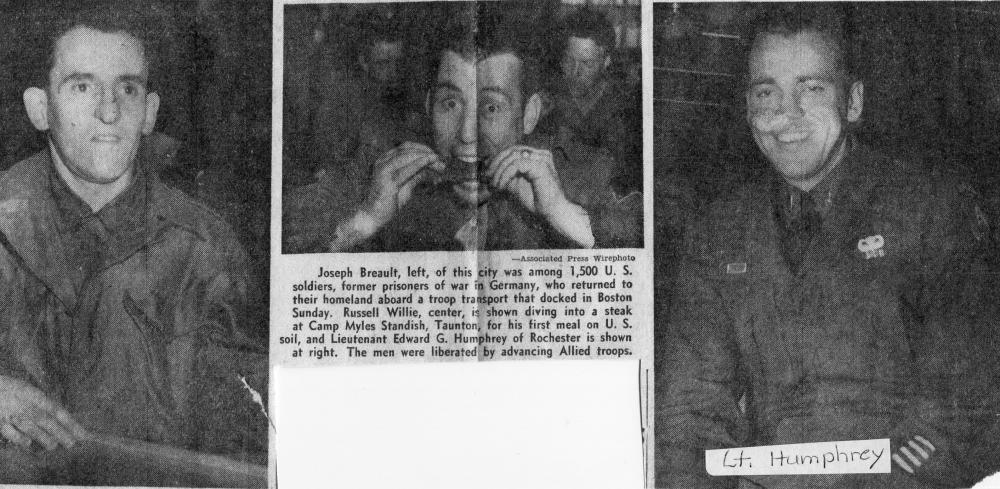Captured by Nazis: A Rochester man’s story of imprisonment and escape
ROCHESTER — As the cold approaches, Connie Eshbach of the Rochester Historical Society thought back to the story of a Rochester man’s frigid fight for freedom as an American POW in WWII and the heartwarming history of his return home.
With every article I write, I hope to engage readers with Rochester's deep and varied history. Some stories seem to take on a life of their own, like the article about Lt. Edward Humphrey's WWII service which was inspired by three newspaper clippings saved by Mary Nute. They told first of Humphrey missing in action over Italy; next as a prisoner of war and lastly his return home. In a following article about the war memorials in Daggett Square, I again mentioned the Lieutenant, as his young son took part in the dedication of the WWII Roll of Honor.
This second mention attracted the attention of Humphrey's niece, who got in touch with me to see if she could get access to the first article that she had missed. I was happy to email it to her with a picture of Lt. Humphrey. She then passed both articles on to her cousin, Allan Humphrey, the 2nd son of Edward Humphrey. He then emailed me with additional information of his father's war experience which was not addressed in the news clippings I referenced.
After being captured in Anzio, Italy, Lt. Humphrey was sent to a POW camp for American officers. The camp, Oflag 64, was located in Szubin, Poland and he was taken there with others in a cattle car. In the 11 months that he spent in this camp, he and the other prisoners were constantly thinking of escape and spent time digging secret tunnels. This activity ceased after they heard on their hidden crystal radio that 50 POWS were killed by their captors after a successful escape from another camp, Stalag 7. Prisoners were in as much danger from malnutrition as from their captors. Humphrey lost 60lbs. and suffered from jaundice while imprisoned.
In 1945, late in the war, the Nazis were becoming fearful of the advancing Soviet Army, so the decision was made to move the prisoners 100 miles into Germany. After assembling 1500 prisoners they proceeded to march them through the bitterly cold January weather. The first night stop of this journey was at a Polish farm where "The POWS huddled in a cow barn to share body warmth, man and beast alike.”
It was then that Lt. Humphrey seized his chance and escaped. Heading east toward the Soviet Army who were at that time part of the Allied Forces, he covered 968 miles to reach Odessa, Russia (now part of Ukraine). One can imagine the dangers and difficulties he must have encountered, though these were memories that he never shared. After 2 and a half months, he along with many other POWS returned to the US on a troop ship to Boston in April of 1945. My original article said that he was freed by Allied Troops. I stand corrected as in reality, he saved himself.















